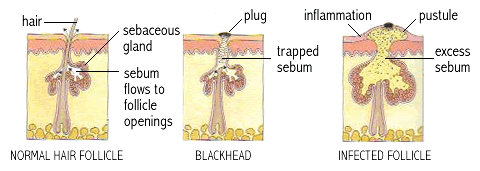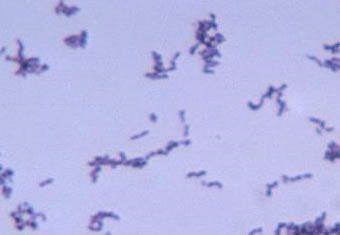Acne
Acne vulgaris (literally, it means
"the common acne") is an inflammatory disease
of the skin. It occurs when oil produced naturally by the skin's
oil glands is overproduced, plugs pores and hair follicles, and
thereby cause an inflammation.

Causes of Acne
During the teenage years, rising hormone levels
cause the skin's oil-producing sebaceous glands
to create excessive amounts of oily secretions called sebum.
This oil drains into the hair follicle and hardens into a plug
that blocks the follicle's pores.
Blocked pores caused bacteria called Propionibacterium
acnes (P. acnes) - bacteria that normally live on
the skin's surface - to grow in the trapped sebum and cause inflammation
called acne lesions or comedones
(singular: comedo).

Meet the bad guys: Propionibacterium acnes grown in thioglycollate
medium.
The major causes of acne vulgaris, especially in
teenagers, are:
- Genetics
The predisposition to developing acne is inherited from either
parents
- Hormones
The increase in production of the sex hormone called androgens
in young men and women during puberty causes the skin's oil
glands to produce excess amount of pore-plugging sebum.
Other known acne causes are prescribed medicine,
cosmetics, stress, skin irritants, and pollution.
Types of Acne Lesions
There are two general forms of acne lesion:
- Whitehead
Acne lesion that stays below the skin surface and is completely
plugged by sebum.
- Blackhead
Open lesion that reaches the skin's surface. The dark color
is actually not caused by dirt - instead, it is caused by the
sebum plug.
Small acne lesions can sometime develop into other, more serious
forms, including papulae, pustules, nodules, and
cysts. These lesions can last a long time, be painful,
and can lead to scarring.
How Common Is It?
Affecting about 85% of Americans in their teenage
and young adulthood, acne is the most common skin condition in
the United States. Most people outgrow acne - however, for some,
it can last well into adulthood.
Treatment of Acne?
For most people, maintaining good hygiene by washing
the affected areas a couple of times a day with mild anti-bacterial
facial soap can reduce excess oil and kill bacteria. Topical over-the-counter
creams containing benzoyl peroxide or herbal
creams containing the anti-septic tea tree oil can also help.
Prescribed medicines for acne include:
- Topical antibiotics, such as benzoyl peroxide, erythromycin,
and clindamycin.
- Oral antibiotics, such as tetracycline and erythromycin
- Tretinoin (Retin-A) cream or gel
- Isotretinoin (Accutane)


